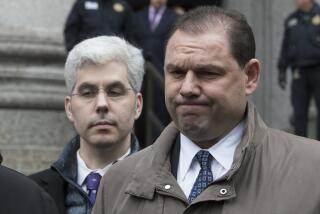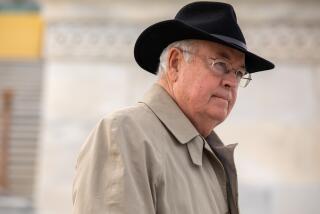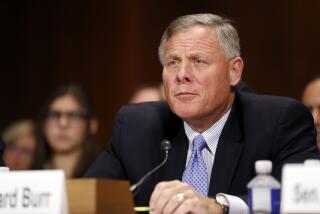Tax Evasion Case Reinstated Against Friend of Clinton
- Share via
WASHINGTON — Webster L. Hubbell’s legal troubles deepened Tuesday when a federal appeals court reinstated tax evasion charges brought by independent counsel Kenneth W. Starr against the former Justice Department official and longtime friend of President Clinton.
The U.S. Circuit Court of Appeals for the District of Columbia, however, said that Hubbell’s constitutional protection against self-incrimination may have been violated when Starr forced him to turn over tax-related records, and the judges asked a lower court to look further into that question.
In a pair of 2-1 rulings, the panel of appellate judges reversed a decision last summer by U.S. District Judge James Robertson, who threw out last April’s tax-fraud indictment of Hubbell, his wife, Suzanna, his accountant and his tax lawyer.
Meeting reporters outside his suburban Maryland home Tuesday, Hubbell said he was disappointed but added: “We hope this matter will come to an end real soon.”
Hubbell, who has accused Starr of prosecuting him in hopes of getting testimony against the president, said he has no intention of implicating anyone else. “I don’t know of any wrongdoing by anyone, and I’m not going to lie to make a case against anyone,” he said.
In his ruling last July, Robertson held that Starr had exceeded his jurisdiction in going after Hubbell on a tax-related matter. In addition, the case was improperly based on documents Hubbell had relinquished under a grant of immunity in return for his pledge to cooperate in the Whitewater investigation, Robertson ruled.
But the appeals court panel, including two Democrat-appointed judges and one Republican appointee, sharply told Robertson that “it is not for lower court judges to undercut” an independent counsel like Starr who is performing his duty “in a manner reasonably approximating that of an ordinary prosecutor.”
While declaring that the tax case should stand, the judges, in a separate action, directed Robertson to conduct further hearings to determine how much Starr knew about Hubbell’s record keeping before the independent counsel forced him to turn over 13,120 financial documents that largely resulted in the tax-fraud case.
Starr must demonstrate that he had “reasonably particular knowledge” of the existence of those records from an independent source to overcome Hubbell’s claim that his surrender of them violated his protection against self-incrimination, the appellate court said. Otherwise, the documents cannot be used in his tax-fraud prosecution, the court ruled.
Starr has argued that he knew about consulting payments to Hubbell from the James Riady family of Indonesia, who are financial supporters of Clinton, and from the city of Los Angeles, but “these snippets of information do not come close to establishing the existence of the myriad of documents sought through the subpoena,” the court said.
In their 70-page discussion of Hubbell’s case, the appellate judges said that Starr had ample reason to investigate the president’s longtime friend on suspicion that more than $700,000 in consulting fees he received from Clinton supporters after he pleaded guilty to theft in 1994 might have been aimed at buying his silence on Whitewater matters.
“The timing, sources and extent of the payments make the belief that they were hush money reasonable,” the panel said.
Starr’s tax indictment accused Hubbell of earning more than $1 million since 1994 but owing the government $894,000 in back taxes and penalties, while spending most of the money to maintain a lavish lifestyle.
A former law partner of First Lady Hillary Rodham Clinton and golfing friend of the president, Hubbell served as associate attorney general, the No. 3 job at the Justice Department, before being forced to resign in March 1994, amid a Starr investigation into his billing practices at the Rose Law Firm in Little Rock, Ark..
More to Read
Sign up for Essential California
The most important California stories and recommendations in your inbox every morning.
You may occasionally receive promotional content from the Los Angeles Times.












